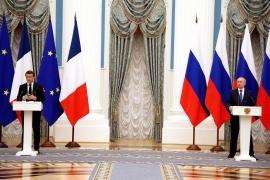Russia, France, and global disorder

On June 8, the Center on the United States and Europe at Brookings held its 17th annual Raymond Aron Lecture, showcasing Thomas Gomart, a French historian of intercontinental relations and the director of the French Institute on Intercontinental Relations (IFRI) in Paris. In his handle, Gomart reviewed the implications of Russia’s invasion of Ukraine for France and the world wide purchase much more broadly. Subsequent his remarks, Brookings Senior Fellow Fiona Hill responded. Interim Director of CUSE Célia Belin and French Ambassador to the United States Philippe Étienne delivered welcome remarks. Belin also moderated the discussion. Just after the program, panelists took audience queries.
Gomart commenced by framing the conflict by way of four bilateral relations. To start with, he viewed as the marriage concerning China and the United States, which he explained as structural to the worldwide get. Most pertinent, in accordance to Gomart, ended up the lessons China is discovering in look at of a hypothetical invasion of Taiwan as a result of its observation of the international and Western responses to Ukraine. Future, Gomart regarded as Russia-European Union relations, particularly with respect to the large upheaval implied by Europe’s energy decoupling from Russia. Thirdly, he assessed Russia’s connection with China, noting that while ties concerning these two international locations seem to be tightening, they are becoming far more differentiated in their world wide positioning. Though Russia is significantly isolated from Western economies and at any time far more reliant on Chinese marketplaces, China stays deeply built-in in the world economy. Finally, Gomart examined U.S.-European relations, offering counterfactuals to the present predicament, together with what may possibly have transpired if the U.S. hadn’t delivered armed forces guidance to Ukraine, but also what may possibly have took place if former President Donald Trump experienced been in office environment at the time of the invasion.
In the second component of his lecture, Gomart supplied three strategies to frame the war in Ukraine. To start with, he argued that the war is colonial in nature and punctuated by Russia’s nuclear abilities. Introducing believability to equally the colonial and nuclear aspects, he argued, is Russia’s history of violence beneath President Vladimir Putin. Gomart proceeded to suggest a world-wide, instead than European, framing of the war in Ukraine. This place, he continued, could be justified by Russia’s record of military, cyber, and unique operations in non-European contexts these types of as Mali and Syria. Last but not least, Gomart examined the war from the perspective of French relations with Russia, looking at both the historical ties concerning the two nations, and the reignited discussion within French foreign coverage spheres about no matter whether shut economic relations between France and Russia are the critical to fostering cooperative, relatively than aggressive relations. Regarding this discussion, Gomart predicted that financial decoupling would not change Putin’s bellicosity although reminding the viewers that Russia “will proceed to be on the European continent wherever Ukraine has the proper to exist by alone.” In mild of the issue of the condition, Gomart advocated for pragmatism while quoting Aron: “In politics, the selection is not among the fantastic and the evil, but relatively involving what is preferable or detestable.”
Hill agreed on the profound reduction of Europe’s finest aggressive gain: peace. She also concurred with Gomart’s emphasis on Europe’s newfound power insecurity — a consequence of decoupling from Russia, an power partner of 6 many years. Hill then moved to a discussion of the war as it exists inside a uniquely Russian assemble of background. She argued that Putin, in his position as “historian-in-main,” has bolstered a discourse that transforms Russia’s victory in Globe War II into a little something of a condition religion, although simultaneously framing Ukraine as an illegitimate political entity with cultural, spiritual, and historical roots in Russia. Hill then drew a causal website link concerning Putin’s historical revisionism and the world wide community’s unwillingness to condemn Russia’s invasion of Ukraine, earning distinct that the efficacy of Putin’s narratives extends considerably outside of Russia’s political borders. Appropriately, she appealed for greater interest to be paid out to Western messaging and for a reframing of the war as one particular of colonial aggression, echoing Gomart’s argument in his lecture.
Just before turning to viewers concerns, Gomart acknowledged the Anglo-American look at of France as a somewhat unreliable companion on Russia, specially in gentle of the de Gaulle period. Nevertheless, he framed France’s relative willingness to interact with Russia as a symptom of sharing a landmass with the armed service ability — some thing that is not legitimate for the U.K. or the U.S. Most importantly, Gomart asserted that regardless of France’s occasional deviation from Anglo-American coverage to Russia, France has usually stood firmly in line with its associates in the encounter of key crises this sort of as the war in Ukraine.
Viewers members inquired about the strengthening the Sino-Russian partnership and what the West could do to interrupt this partnership. Hill responded that Sino-Russian partnership would demand “a 360-degree perspective… on European security and on trans-Atlantic relations,” and that the Russian invasion of Ukraine could serve to embolden Chinese aggression from Taiwan. She further included that engaging with China on the integrity of borders — a norm that they have historically endorsed — could be a way to mitigate the consequences of Russia-China partnership, if not to weaken it by nature of Russia’s flagrant disregard for this norm. Gomart, for his section, included that it was not only critical to take into consideration the Sino-Russian partnership, but also the increasing solidarity among users of the Shanghai Cooperation Organisation at large. Moreover, Gomart reminded the viewers of preceding tries to form a “triangle” involving Delhi, Beijing, and Moscow. To this outcome, he advisable the enhancement of a framework for “for long run discussion” on Asia, which he selected the “rising continent.”








